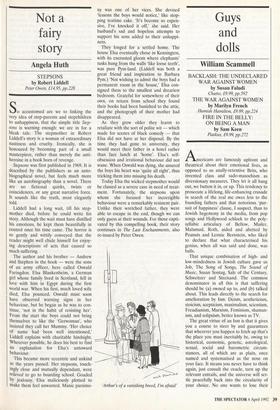Not a fairy story
Angela Huth
STEPSONS by Robert Liddell Peter Owen, f14.95, pp.228 So accustomed are we to linking the very idea of step-parents and stepchildren to unhappiness, that the simple title Step- sons is warning enough: we are in for a bleak tale. The stepmother in Robert Liddell's story is a woman of extraordinary nastiness and cruelty. Ironically, she is honoured by becoming part of a small masterpiece, rather than merely the anti- heroine in a book born of revenge.
Stepsons was first published in 1969. It is described by the publishers as an auto- biographical novel, but feels much more like an autobiography than a novel. There are no fictional quirks, twists or coincidences, or any great narrative force. It sounds like the truth, most elegantly told.
Liddell had a long wait, till his step- mother died, before he could write his story. Although the wait must have distilled his emotions, he kept them beautifully in control once his time came. The horror is so gently and wittily conveyed that the reader might well chide himself for enjoy- ing descriptions of acts that caused so much suffering.
The author and his brother — Andrew and Stephen in the book — were the sons of an army officer, here called Oswald Faringdon. Elsa Blankenheim, a German girl whose family lived in Scotland, fell in love with him in Egypt during the first world war. When his first, much loved wife died, Elsa pounced. Oswald must soon have observed warning signs in her behaviour, but he began as he was to con- tinue, 'not in the habit of resisting her'. From the start the boys could not bring themselves to like the `Gerwoman', who insisted they call her Mummy. 'Her choice of name had been well intentioned,' Liddell explains with charitable hindsight. Wherever possible, he does his best to find an explanation for Elsa's untoward behaviour.
This became more eccentric and unkind as the years passed. Her stepsons, touch- ingly close and mutually dependant, were relieved to go to boarding school. Goaded by jealousy, Elsa maliciously plotted to make them feel unwanted. Manic parsimo-
ny was one of her vices. She devised `lessons the boys would notice,' like stop- ping teatime cake. 'It's become so expen- sive, I've knocked it off,' she said. Her husband's sad and hopeless attempts to support his sons added to their unhappi- ness.
They longed for a settled home. The house Elsa eventually chose in Kensington, with its encrusted gloom where elephants' tusks hung from the walls 'like loose teeth', was pure Pym-land. (Liddell was both a great friend and inspiration to Barbara Pym.) 'Not wishing to admit the boys had a permanent room in the house,' Elsa con- signed them to the smallest and dreariest bedroom. Grateful for somewhere of their own, on return from school they found their books had been banished to the attic, and the photograph of their mother had disappeared.
As they grew older they learnt to retaliate with the sort of polite wit — which made for scenes of black comedy — that Elsa did not have at her disposal. By the time they had gone to university, they would meet their father in a hotel rather than face lunch at 'home'. Elsa's self- obsession and irrational behaviour did not wane. When Oswald was dying, she assured the boys his heart was 'quite all right', thus tricking them into missing his death.
Today Elsa the wicked stepmother would be classed as a severe case in need of treat- ment. Fortunately, the stepsons upon whom she focused her incorrigible behaviour were a remarkably resistent pair. Unlike their wretched father, they were able to escape in the end, though we can only guess at their wounds. For those capti- vated by this compelling book, their story continues in The Last Enchantments, also re-issued by Peter Owen.
Arthur's of a vanishing breed, I'm afraid'


























































 Previous page
Previous page